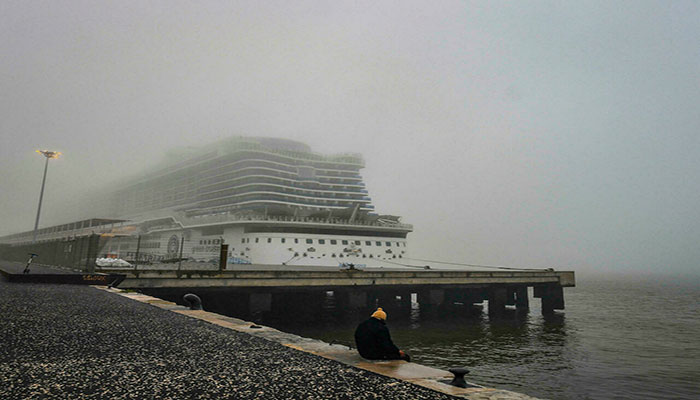France moves towards vaccine pass to fight Omicron’s tidal wave; Covid cases halt Canaries-bound cruise ship
Lisbon: Some 3,000 passengers, mostly Germans, saw their Canary Islands-bound cruise ship halted on Monday after a Covid-19 outbreak forced them to disembark in Lisbon, Portuguese authorities said.
The first passengers to test positive on the German-built AIDAnova were transferred to a bus bound for Lisbon airport before dawn, Lisbon’s chief of maritime police Diogo Vieira Branco said. He added the remainder were set to follow by the end of the afternoon.
The vessel with 2,844 passengers and 1,353 crew aboard docked in Lisbon after arriving from the northwestern Spanish port of La Coruna. It had been due to sail on to Spain’s Canaries via the Portuguese island of Madeira.
After the first positive cases emerged Wednesday, operator AIDA Cruises Sunday elected to halt the cruise "in the interest of the safety and health of its guests and crew," a spokesman told AFP.
By Monday, the vessel had logged 68 positive virus cases -- 60 of them among the crew. "They tried to find replacements for the crew members but could not so we had no option other than to leave," one passenger, Ulla Lingnau, told AFP.
Branco said those who tested positive were either asymptomatic or had slight symptoms, adding most were being put up in hotels in Lisbon to respect quarantine restrictions.
AIDA Cruises stated that "all guests on board AIDAnova from the age of 12 and our crew are fully vaccinated" and tested via antigen tests prior to arrival and also prior to boarding with PCR tests in the cruise terminal.
The 5,200-capacity AIDAnova, which went into service in 2018, was due to sail out of Lisbon on Wednesday afternoon.
Its next cruise booking is a January 15 departure from La Palma to the Canaries.
Meanwhile, French MPs on Monday began debating draft legislation that would require most people to be vaccinated against Covid-19 to enter public spaces such as bars, restaurants and long-distance public transport.
Dubbed the "vaccine pass", the bill’s headline measure is aimed at getting France’s remaining five million unvaccinated people over 12 to accept a shot.
So far, a recent negative test has been enough to secure a "health pass" granting access to the same activities.
But the Omicron variant of coronavirus has stoked average daily confirmed cases to more than 160,000 per day over the past week, with peaks above 200,000.
"The tidal wave has indeed arrived, it’s enormous, but we will not give in to panic," Health Minister Olivier Veran told parliament. Reacting to critics who say the law infringes on people’s civil liberties, Veran added that "selfishness often hides behind talk of supposed liberty".
Although there is fierce opposition to the bill in parts of the left and far-right, the support of President Emmanuel Macron’s centrist party and most opposition conservatives and socialists should see it through the lower house.
It is expected to come into force on January 15 after passing through the upper house Senate. As well as the headline shift to granting access to many aspects of public life based on vaccines, the bill would also mean heavier penalties for those sharing or forging their vaccine passes, and for venues failing to check up on them.
People holding a fake pass could face a sentence as high as five years in prison and a fine of 75,000 euros ($85,000). France has also tweaked rules for how schools should react to infected pupils, allowing them to return sooner if more frequent follow-up tests prove negative after just five days.
Later Monday, Prime Minister Jean Castex was expected to meet with ministers to discuss the impact on crucial services like hospitals, transport, policing and energy from large numbers of people calling in sick.
In a related development, India extended Covid vaccinations to teens aged 15-18 on Monday, after officials tightened restrictions in big cities to avoid a repeat of last year’s devastating outbreak.
More than 200,000 people around India died in a huge spring virus wave that overwhelmed hospitals and crematoriums. Health workers have since administered more than 1.4 billion vaccine doses but less than half of India’s population is fully inoculated, according to government data.
Hundreds of teenagers patiently queued with their parents on Monday morning outside a school turned into a makeshift medical centre in the capital New Delhi. "It’s really great to have your first vaccine," said 16-year-old Soumadeep, after receiving his first dose of the Indian-made Covaxin.
"It’s like a new year gift for the children." Officials have fretted over the arrival of the Omicron coronavirus variant and a sudden rise in daily infections, with some of India’s biggest urban centres imposing fresh restrictions last week.
New Delhi and tech hub Bangalore are under overnight curfews from 10 pm each evening, with bars and restaurants in both cities ordered to operate at half capacity.
Mumbai, India’s commercial capital, has barred public gatherings of more than four people from 9 pm to 6 am and restricted wedding ceremonies to 50 guests.
Last year’s Delta variant wave in India struck after one of the world’s biggest religious gatherings, the Kumbh Mela, which attracted around 25 million Hindu pilgrims.
That festival, along with large state election rallies, was blamed by experts for fuelling the surge. Despite a record rise in global infections, the Omicron outbreak has seen a less dramatic increase in hospital admissions, fuelling hopes the variant is less severe than Delta and other strains.
Meantime, Kuwait has urged its citizens to leave several European countries including Britain, France and Germany because of a surge in cases of the Omicron coronavirus variant.
In a series of statements overnight Sunday, the oil-rich Gulf state also warned Kuwaitis, often big spenders abroad, to avoid travelling to the countries.
The foreign ministry said they should "delay their trips" generally and, in particular, to France, Germany, the United Kingdom, Spain and Italy.
It said its citizens should leave those countries "considering the significant and unprecedented rise in the number of new cases" of Covid-19.
Europe has in the past few months again become the pandemic’s epicentre and is battling an upsurge of cases spurred on by the highly transmissible Omicron strain. The countries with the highest ratio of infections per 100,000 inhabitants in the world were all in Europe, according to an AFP tally on Saturday.
-
 Charlie Puth Admits He Was 'very Cringe' During Early Fame
Charlie Puth Admits He Was 'very Cringe' During Early Fame -
 Prince William’s ‘failed’ Mother Diana Sparks Another Row With Prince Harry: ‘It’s Crossing A Line’
Prince William’s ‘failed’ Mother Diana Sparks Another Row With Prince Harry: ‘It’s Crossing A Line’ -
 Jennifer Garner Reflects On Special Bond With Mark Ruffalo
Jennifer Garner Reflects On Special Bond With Mark Ruffalo -
 King Charles Stuck With Supporting Prince Harry 'great Cause'
King Charles Stuck With Supporting Prince Harry 'great Cause' -
 Nicola Peltz Is 'the Issue' In Beckham Drama, Ex Stylist Claims
Nicola Peltz Is 'the Issue' In Beckham Drama, Ex Stylist Claims -
 Expert Speaks Out On Andrew’s Vicious Circle With Jeffrey Epstein Of Information Trading & Honey Traps
Expert Speaks Out On Andrew’s Vicious Circle With Jeffrey Epstein Of Information Trading & Honey Traps -
 Prince William, Kate Middleton Honour Scottish Culture By Weaving Tartan
Prince William, Kate Middleton Honour Scottish Culture By Weaving Tartan -
 King Charles’ Pact With Andrew Comes Out And It Ensures Beatrice & Eugenie Each One Thing
King Charles’ Pact With Andrew Comes Out And It Ensures Beatrice & Eugenie Each One Thing -
 ASAP Rocky Recalls 'embarrassing' First Meeting With Rihanna
ASAP Rocky Recalls 'embarrassing' First Meeting With Rihanna -
 Archie, Lilibet’s Chances At Meeting King Charles Get Promising Update: Here’s Why
Archie, Lilibet’s Chances At Meeting King Charles Get Promising Update: Here’s Why -
 Claire Foy Shares Rare Views On Typecasting Amid New Gig
Claire Foy Shares Rare Views On Typecasting Amid New Gig -
 Britney Spears Raves About Madonna In New Social Media Post
Britney Spears Raves About Madonna In New Social Media Post -
 Hailey Bieber Shares Sweet Snap Of Husband And Baby
Hailey Bieber Shares Sweet Snap Of Husband And Baby -
 Therapist Killed In Office As Former Client Launches Knife Attack
Therapist Killed In Office As Former Client Launches Knife Attack -
 Gaten Matarazzo Brands 'Stranger Things' Final Scene 'nerve-racking'
Gaten Matarazzo Brands 'Stranger Things' Final Scene 'nerve-racking' -
 David Beckham Speaks Out After Son Brooklyn Beckham's Shocking Post
David Beckham Speaks Out After Son Brooklyn Beckham's Shocking Post




